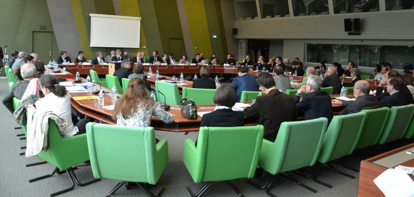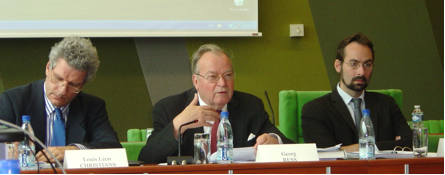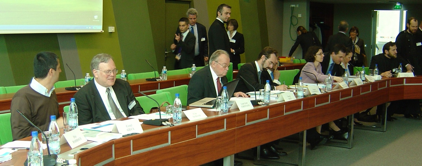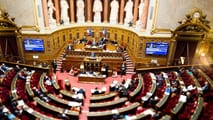Seminar on the Autonomy of the Church in the Recent Case-law of the European Court of Human Rights and of the USA Supreme Court</p>
June 7, 2012, 10 am to 12, Council of Europe

The European Centre for Law and Justice organized a seminar on the recent case law of the European Court of Human Rights (ECHR) and of the USA Supreme Court on Church autonomy, in cooperation with the Centre d'Etudes et de Recherches Européennes: Religion et Société (Bruxelles - CERERS), the Catholic University of Louvain (UCL) and the Strasbourg Consortium on Freedom of Conscience and Religion at the Council of Europe.
This was the occasion to discuss the protection afforded in Europe and in the USA of the internal freedom enjoyed by Churches in their relationship with their religious members and employees and also to discuss the problematic aspects of the recent judgment Sindicatul “Pastorul cel bun” v. Romania which is currently before the panel of the ECHR for a potential referral to the Grand Chamber.
Approximately 80 people participated in the two hours seminar, including around 20 ambassadors of the Council of Europe member States, representatives of different Churches in Europe, law professors, staff of the Council of Europe, lawyers and other practitioners in this field. The discussions were moderated by Dr. Grégor PUPPINCK, Director of European Centre for Law and Justice.
The first part of the seminar addressed “the principle of autonomy: fundamental guarantee of the distinction between States and religious communities”:

- Prof. Cole DURHAM, Director of the International Center for Law and Religion Studies, USA, and member of the Panel of Experts of the OSCE / ODIHR on freedom of religion and belief, gave an overview of the principle of autonomy of Churches and religious communities, as it is established in the ECHR and USA Supreme Court’s case-law.
- Prof. Dr. Georg RESS, judge at the ECHR between 1998 and 2004 (Germany); mentioned the principle of autonomy, as guaranteed by the Constitution of Germany, wondering whether a Church can exist without such a guarantee and affirming that Churches should benefit of a presumption of autonomy even for functions that are not strictly religious (choir members, hospital employees, etc), as all its employees participate in the Church mission. He also recalled the Court's case-law in cases against Germany and drew the attention on some errors in the Obst v. Germany and Schuth v. Germany judgments, namely the application of the “proportionality test” instead of a proper definition of the principle of autonomy of the Church that would exclude the applicability of certain issues of private life and the qualification of “adultery by the Court from its scope.
- Javier BORREGO-BORREGO, judge at the ECHR between 2003 and 2008 (Spain), presented Lombardi Vallauri v. Italy case in which, for the first time, the Court found a violation of the right to freedom of expression on its procedural limb, judging that approach unrealistic and in violation of the principle of autonomy of religious communities, as the judges found themselves in a position being obliged to consider the affirmations of Mr. Lombardi Vallauri in the light of the Doctrine of the Church. He also discussed the Fernandez Martinez v. Spain judgment which was found to be very respectful for the Church autonomy, as the judgment expressly mentioned the relationship based on confidence between a religion teacher and his Bishop, the increased obligation of loyalty and the principle of religious autonomy.
- Eric RASSBACH, National Litigation Director at the Becket Fund for Religious Liberty, presented the issue of Church autonomy before the USA courts, exemplifying it with the Hosanna Tabor case which was decided in January this year by the Supreme Court, the principles established in this case being applicable also in cases in Europe, as they are common to any democratic society. As Mr. Rassbach said, the Justices of the Supreme Court were actually confronted with the issue of “who has to pick the priest or the rabbi, the Church or the judges?” and that at the end they unanimously decided that the doctrine of “ministerial exception” is valid and that the Church’s autonomy in hiring and firing clergy is absolute, without balancing it with other values. He also said that one should not forget that those issues are not only about the autonomy, but also about the meaning for the State in doing that, as history showed what kind of States interfered with Church autonomy.
The second part of the seminar addressed the principle of autonomy and the case Sindicatul “Pastorul cel bun” v. Romania ":
- Prof. Igor PONKIN, Director of the Institute of relations between the State and religious denominations and Law (Moscow), addressed various errors of the judgment: the Court’s interpretation of the principle of separation between Church and State and of the relationship between the Church and its priests, reducing the hierarchical relationship of the priests to a labor relationship and attributing an absolute character to the latter, which inevitably leads to a violation of the freedom of religion of the Christian community. He also mentioned that the Court wrongly considered that religious organizations should be assimilated to any other organization and that the rules of the Church should not prevail over some of the civil rights. As consequences of that judgment, he could enumerate the risk for the State, and finally for the ECHR, arbitrarily to interfere with the internal affairs of the Church and the double standard of the Court when judging such cases.
- Prof. Louis-Léon CHRISTIANS, Catholic University of Louvain la Neuve, Chair of Law and Religion (Belgium), raised certain issues related to the principles and procedural and substantive ambiguities of the judgment Sindicatul “Pastorul cel bun” v. Romania, such as whether the internal courts should have better developed their reasoning, whether the reproach made to the priests was that they wanted to form a union or whether it was to the Church to sanction them. He also mentioned the ambiguity of the references to the Negrepontis v. Greece case which concerned an unclear religious customary law and the statute of family law, meanwhile the Sindicatul case concerned the Status of the Orthodox Church, which was integrated to the Romanian legal order and the internal organization of the Church.
- Prof. Patriciu VLAICU, Professor of Canon Law at the University of Cluj (Romania), presented the relevant provisions of the Status of the Orthodox Church, underlying the fact that the Church is a community and therefore a relationship of the type interior/exterior cannot exist inside of it, the judgment of the Court being a severe violation of the principle of community of the Church. He affirmed that according to canon law, the issue in Sindicatul is related to the manifestation of the doctrine and not a disciplinary matter, as the priest in his entire life represents the Church. He mentioned that the Church does not forbid the freedom of association, on the contrary, and that is proved by the existence of 189 associations in the Church in Romania, but the exercise of this freedom should be reasonable and not blind, in order not to introduce antagonism in the Church and not to double the institutions of the Church. He also recalled that only once the State imposed unions in the Church, in 1945 by a totalitarian regime and in order to weaken the Church.
- Mr. Costel GILCA, Lawyer, employment law and labor law in Bucharest (Romania), explained, , the nature of the employment relationship of the clergy and their duty of loyalty from the point of view of the Romanian legal order.
- Irina CAMBREA, co-agent of the government of Romania to the ECHR, raised the question of the relationship, under articles 9 and 11 of the Convention, between the Church and the priest’s union, as the relationship between the mother association and the daughter association.
The third part of the seminar was opened for discussion and questions, questions being put from the perspective of the individual freedom of association under the European Convention of Human Rights.

RELATED DOCUMENTS:
- Report containing the related documents (Document de séance du séminaire) ;
- Photos of the seminar ;
- The interventions will be published on the ECLJ website.









